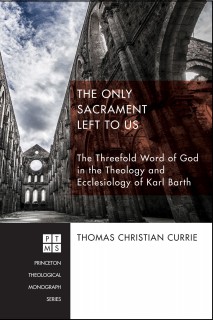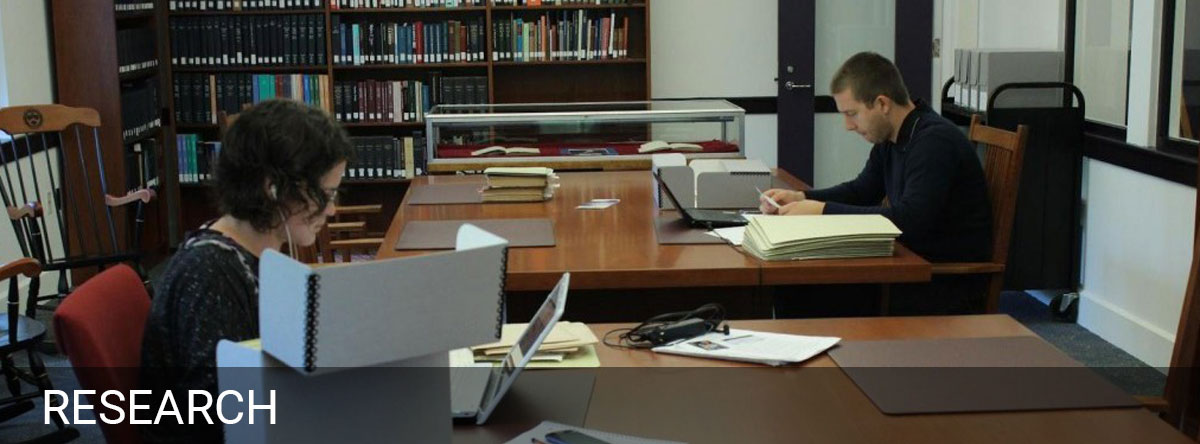 Currie, Thomas. The Only Sacrament Left to Us: The Threefold Word of God in the Theology and Ecclesiology of Karl Barth (Eugene: Wipf and Stock Publishers, 2015), 196 pp. $23.00 (paperback).
Currie, Thomas. The Only Sacrament Left to Us: The Threefold Word of God in the Theology and Ecclesiology of Karl Barth (Eugene: Wipf and Stock Publishers, 2015), 196 pp. $23.00 (paperback).
Reviewed by Catherine C. Tobey (February 15, 2016)
Mega churches in urban centers and small suburban and rural congregations suffer alike from priestly mentalities and cults of personality. In The Only Sacrament Left to Us, Thomas Christian Currie poises the insight of an unsatisfied and passionate theologian who calls us back to Christ as our center, our life, our everything, and commissions us all to an Advent state of mind.
The key, for Currie, is the threefold Word of God, which is not only intimately tied to Karl Barth’s concept of the church, but also to his whole venture. Currie takes a step forward in Barth studies by presenting a case for Barth’s development of the threefold Word of God as it relates to Barth’s gospel-centric actualistic ecclesiology. Here, he beckons readers to consider once and for all their notion of how God works in the church.
Currie begins his study with a thorough overview of Barth’s earliest efforts regarding the threefold Word of God, which were inspired by Reformation theologians such as Martin Luther and Heinrich Bullinger. Throughout his time in Göttingen and Münster, Barth grappled with this concept, concerned with affirming God’s dynamic freedom, denying the divinization of Scripture, and prioritizing God’s Self-revelation; his conclusions were published in Church Dogmatics I/1 and I/2. Currie closes the first chapter after tracing Barth’s conception of Christian preaching, exposing how proclamation becomes the Word of God and what this means for humanity.
Though, unsurprisingly, “Barth’s concept of the threefold Word of God has a christological emphasis,” it also has “a pneumatological dimension” (30). In the second chapter, Currie turns to the vital role of the Holy Spirit who “is the source of unity between the one Word of God and its secondary forms” (41). Currie calls attention to the idea that the Spirit makes Christ’s presence manifest as the church engages Scripture and proclaims the gospel. Throughout this event, humanity remains humanity, never gaining control of the Word of God but necessarily relying on the Holy Spirit to carry out its purpose.
In the third chapter, Currie puts the church at the forefront of the discussion, digging into Barth’s early theological writings and the first three volumes of the Church Dogmatics. His reflections on the integral relationship Barth envisions between the threefold Word of God and the church’s life are thought provoking, to be sure, but they leave the reader feeling scattered. Though situated as a crux, it is difficult to connect with Currie in this section, which is perhaps due to either the lack of clear structure or the esoteric nature of his discussion. The latter of which is surprising, due to his role as both pastor and theologian.
In the next chapter though, Currie comprehensively considers contemporary scholarship regarding Barth’s use and revision of the threefold Word of God, seamlessly intertwining quotations and explaining a wide diversity of complex perspectives. He also takes the time to grapple with the content of Church Dogmatics IV/3, where Barth’s engagement with the threefold Word of God culminates as he revisits and amends it. Currie points to Barth’s renewed interest in solidifying and distinguishing Christ as the only Word of God, who “alone introduces Himself, presents Himself, and declares the good news of the gospel” (92).
One example of this shift is Barth’s expanded description of where Christ can manifest himself and create witnesses, namely, outside of the scope of Scripture and proclamation. In addition, rather than speaking chiefly of proclamation like before, Barth emphasizes the role of prayer. Here, Currie clarifies that Barth does not seem to dismiss his earlier thoughts regarding the threefold Word of God, but simply seeks to ensure the church knows their place in this relationship with Christ. Indeed it is as if Barth wants to warn the church, and particularly the clergy, against acting as if they had a corner of God.
In the final chapter, Currie demonstrates the current relevance of Barth’s conception of the threefold Word of God to the Church, ecclesiology, and Barth studies, focusing on the reasons behind Barth’s revision. Faced with the rise and expansion of the church, Barth sought to remind it of its humanity, rejecting any “attempts to clutch, possess, or lay claim to the contemporary presence of Christ” (146). Currie insists, on behalf of Barth, “The church is not a crutch, it possesses no inside track nor does it exist as a sphere of superiority in relation to others” (146).
By tracing the development of the threefold Word of God in Barth’s work, Currie demonstrates a deep appreciation for Barth and achieves a great depth; this is nearly paralleled in his excellent engagement with other scholars, including those who were highly critical of Barth. Currie stays close to Bruce McCormack’s unparalleled insight throughout this volume, drawing in other modern sources of wisdom, like Kimlyn Bender and Eberhart Jüngel, as appropriate.
The volume is dense, packed with richness applicable to both the academy and the church today. Readers can’t help but walk away with a heavy heart for the church, hopeful that as it faces the demise of Christendom, it will turn away from its entitled, self-sufficiency, open its eyes to its Lord, and be freed from itself so that it may truly be the church.
The views expressed here are strictly those of the author; they do not necessarily represent the views of the Center for Barth Studies or Princeton Theological Seminary.


